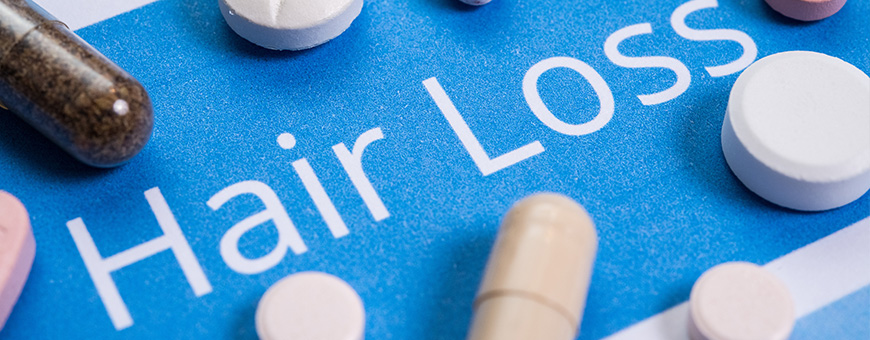Hair loss can be overwhelming, especially when it’s progressive or hereditary. For those seeking real solutions, several medications are available to slow down or reverse hair loss—each with its own strengths, side effects, and suitability.
In this article, we’ll explore the 5 most common hair growth medications, compare them to shampoos and natural formulas, and help you decide what might work best for you.
What Are the Common Hair Growth Medications?

1. Finasteride
Finasteride is an oral prescription medication commonly used to treat male pattern baldness. It works by inhibiting the enzyme 5α-reductase, which reduces the conversion of testosterone into DHT (dihydrotestosterone)—a hormone linked to follicle shrinkage and hair loss.
- Effectiveness: Most users see visible improvements after 4–6 months, such as thicker, faster-growing hair. Over 90% experience reduced hair loss and some regrowth after a year of continued use.
- Who should avoid: Not suitable for women, especially those who are pregnant or trying to conceive, due to potential risks to fetal development.
- Side effects: Low libido or erectile dysfunction, though these are rare and typically reversible.
- Note: Finasteride primarily prevents further hair loss rather than stimulating new growth, so results may be less noticeable if follicles are already weak or malnourished.
2. Dutasteride
Dutasteride works similarly to Finasteride by blocking DHT production, but it inhibits both Type I and Type II 5α-reductase, offering broader suppression.
- Effectiveness: May reduce hair loss over a wider area than Finasteride.
- Side effects: Similar to Finasteride but more pronounced, with a higher chance of sexual side effects.
- Not suitable for: Women and pregnant individuals.
3. Minoxidil
Minoxidil is a topical solution or foam used by both men and women. It works by dilating blood vessels in the scalp, increasing circulation, and promoting follicle stimulation.
- Effectiveness: In clinical trials, 40% of users with 25–99% hair loss saw visible regrowth after one year of using 5% Minoxidil.
- Side effects: Itching, flaking, redness, and skin irritation on the scalp. In some cases, users report increased heart rate or blood pressure.
- Extra note: Some users experience unwanted body hair growth (hypertrichosis).
4. Glucocorticoids (Steroid Injections)
Used primarily for alopecia areata or patchy hair loss, these steroids are injected directly into the affected areas, such as the eyebrows or beard.
- Effectiveness: Regrowth can often be seen within 4 weeks.
- Side effects: Skin thinning or atrophy at the injection site. Not recommended for repeated use in the same area over a short period.
5. Anthralin
Anthralin is used to treat autoimmune-related hair loss such as alopecia areata, and is safe for both adults and children.
- Effectiveness: Hair may begin regrowing within 2–3 months of regular application.
- Side effects: Skin irritation, redness, and itching. It’s typically applied for 20–60 minutes before being washed off to minimize discomfort.
Who Should Consider Hair Growth Medications?

- Individuals with moderate to severe male pattern hair loss
- Those with alopecia areata or autoimmune-related hair loss
- People whose hair follicles are still active (visible thin or soft hairs)
What About Early Hair Loss?
If you’re experiencing early-stage hair loss, it’s worth starting with:
- Lifestyle changes (e.g., stress management, better sleep)
- Nutritional support
- Scalp care with mild, anti-inflammatory shampoos
However, if hair loss is progressing or you have a family history, early use of medications like Minoxidil or Finasteride may help slow down further loss.
Who Should Avoid or Be Cautious?
- Pregnant or breastfeeding women (especially with Finasteride or Dutasteride)
- People with chronic conditions or known medication allergies
- Individuals under 18 should consult a professional before using Minoxidil
Will Hair Fall Out Again After Stopping Medication?

In most cases, yes.
Hair growth medications require ongoing use to maintain their results. If you stop taking them, the original factors (like DHT or immune-related issues) will continue to affect the follicles, and hair loss may resume.
That’s why it’s important to build a scalp care routine alongside medication, not just rely on medication alone.
How to Make the Transition Smoother:
- Use a DHT-blocking shampoo to support the scalp environment
- Apply serums with active growth factors to nourish and protect follicles
- Focus on scalp health maintenance to reduce inflammation, buildup, and stress
- Ensure consistent lifestyle habits (diet, sleep, stress management) that support hair health long term
What’s the Difference Between Medications, Shampoos, and Natural Hair Serums?

| Type | How It Works | Strength | Best For |
|---|---|---|---|
| Medications | Alters hormone or follicle cycle |
Strong, clinically proven |
Moderate to severe hair loss (genetic/hormonal) |
| Hair Growth Shampoos | Improves scalp health, reduces buildup & inflammation | Mild to moderate, supportive |
Early to moderate hair loss or thinning, preventive care, and long-term maintenance |
| Herbal or Natural Serums | Anti-inflammatory, antioxidant-rich | Gentle, long-term | Sensitive scalps, natural wellness approach |
The best approach often combines science-backed treatments + scalp care + healthy lifestyle.
Looking for a gentle yet effective way to start?
Try Histemo Ultra Scalp Care Shampoo —
A mild, nutrient-rich formula that helps cleanse, nourish, and rebalance your scalp for healthier, fuller hair.
